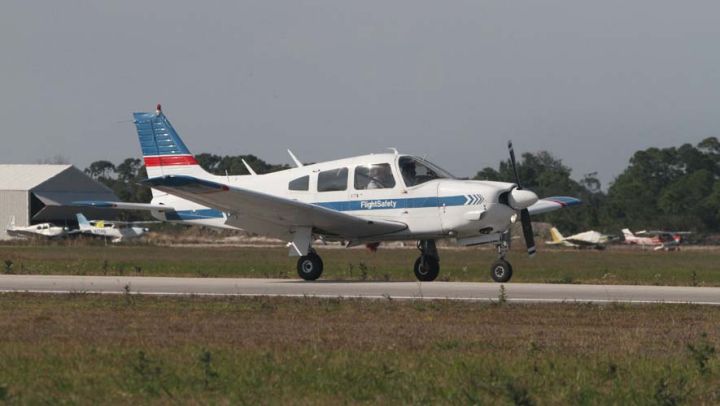
SEBASTIAN — A second flight training school is coming to the Sebastian Municipal Airport, continuing the legacy of training that started when the U.S. military built the airport to train pilots during World War II.
A company already at the airport, Rud Aero, which builds experimental aerobatic aircraft, plans to start a regimented flight school. That school would be based in the administration building.
Rud Aero, owned by Taras Rud, plans to start with a single Cessna 172 plane and a single instructor, Pilot Robert Schultz, who represented Rud when a lease agreement went before the Sebastian City Council earlier this month.
The company currently has 40 employees and designs, develops, manufactures and sells aircraft. The bulk of the work is done off-site in Roseland.
The crafted pieces of the aircraft and taken to the hangar where Rud Aero is located at the airport. The pieces are assembled and the planes are then marketed and sold.
But the company’s expansion at the airport into the administration building for flight training has not come without questions and concerns from some in the community and on the council.
Roseland residents Jackie James and Cy Carlson raised issues with increased air traffic and environmental effects.
James said she didn’t have planes flying over her home when she moved to Roseland in the early 1990s. Five years there, though, and that changed – now there is steady traffic overhead.
Carlson echoed concerns raised by others about lead castoff from planes’ fuel. Their comments followed those of Vero Beach residents Florence Licata and David Risinger, both of whom are members of the Airport Oversight Committee in Vero Beach – a private group that has no official sanctioning from the City of Vero Beach.
Licata and Risinger urged the Sebastian City Council to not approve the lease with Rud Aero for its flight school, citing increased air traffic would increase the amount of lead emissions from the planes.
Licata said planes at Vero Beach’s airport “spritzes” the surrounding area with 1,200 to 2,000 pounds of lead each year.
“It’s a public health risk,” Licata said. “Nature needs to be protected.”
Risinger agreed.
“Don’t ignore health and safety for jobs,” he told the council.
Council members didn’t raise any objections or ask any questions regarding lead emissions from the airport’s traffic. After the meeting, Airport Director Joe Griffin said there is no reason to be concerned about lead emissions at the Sebastian Airport.
“There’s more lead in outboard motor boats,” he said.
Griffin added that Sebastian’s airport sees an estimated 20,000 flights per year – just 10 percent the amount of traffic that Vero Beach’s airport sees.
He conceded that the bulk of the traffic at the airport is from Vero Beach’s Flight Safety school, which practices touch-and-go maneuvers, something the school can’t easily do at its home school given the amount of air traffic there.
How an additional flight school – like Flight Safety – would affect air traffic and safety at the Sebastian airport remains to be seen.
“I’m always concerned about safety,” Griffin said, adding that, with Rud Aero, he’d be able to walk down the hall at the administration building and talk to officials immediately if there were any issues.
With Vero Beach’s Flight Safety, Griffin can only make a phone call.
And while a regimented flight school could eventually mean numerous planes and heavy air traffic, Griffin said that’s not expected within the first few years.
“It’s going to take a while to get going and will grow very slowly,” he said.
The other flight “school” at the airport is run by Sebastian Aero Services, a fixed-base operator that has been at the municipal airport for more than two decades.
Owner Robert Taylor has been providing flight instruction to individuals for 26 years. His instruction is more flexible, where students can come and go as they please.
Over the years, he’s trained several hundred people, he said.
He isn’t convinced that the new flight school won’t bring additional traffic to the airport.
“I think it’s going to be a lot of traffic,” Taylor said, noting that traffic is already heavy with Flight Safety’s maneuvers, Skydive Sebastian’s parachutists, and even Florida Institute of Technology students.
Taylor said he doesn’t see Rud Aero’s flight school as competition to his own business, noting that the school and his business would attract a different type of student.
“We’ll see what happens,” he said.
As for the Sebastian Airport itself, Griffin points to the city’s ability to diversify it economy, which he has worked to do and Rud Aero fits into that plan.
“We’re little ol’ Sebastian,” Griffin said. “We’re not regarded as an aviation mecca.”
The City of Sebastian, using a new hangar as incentive, was able to relocate LoPresti Aviation from the Vero Beach airport when the company was being wooed out of state.
Enticing LoPresti to stay in Indian River County meant keeping about 20 jobs at a time when the unemployment level was reaching new highs.
“Lots of towns want an airport but don’t have one,” Griffin said, explaining that airports help to diversify the economy by providing aviation opportunities.
With LoPresti, Velocity, Skydive Sebastian, Sebastian Aero Services, Rud Aero, 2 Bums, and others, there are approximately 100 jobs at the airport with plenty of room for more growth.
Currently, the city has two 10-acre areas it can build on or lease.
Leveraging funds from aviation fuel tax, the city has been able to secure grants from the Florida Department of Transportation and the Federal Aviation Administration to build two hangars – Hangar A, where LoPresti operates, and Hangar B, where Rud Aero is located.
The city could again find grants to build more hangars for prospective tenants. Griffin said the city, instead, is creating two industrial park “roads” – cul-de-sacs with underground infrastructure.
Doing so helps the property be shovel-ready for development and helps the city market itself to potential tenants.



